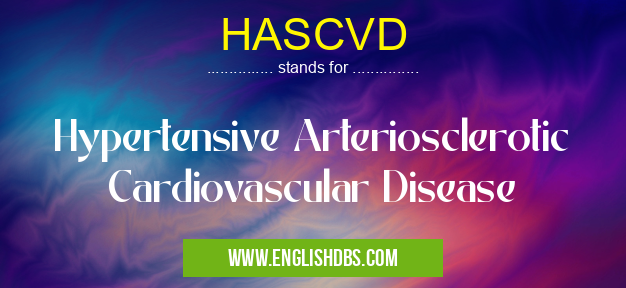What does HASCVD mean in PHYSIOLOGY
Hypertensive Arteriosclerotic Cardiovascular Disease (HASCVD) is a serious condition resulting from high blood pressure and damage to the arteries. It is an area of ongoing research and important development in the field of cardiovascular health, as it can lead to a range of dangerous long-term health complications. This article will provide an introduction to HASCVD and answer five commonly asked questions about the condition.

HASCVD meaning in Physiology in Medical
HASCVD mostly used in an acronym Physiology in Category Medical that means Hypertensive Arteriosclerotic Cardiovascular Disease
Shorthand: HASCVD,
Full Form: Hypertensive Arteriosclerotic Cardiovascular Disease
For more information of "Hypertensive Arteriosclerotic Cardiovascular Disease", see the section below.
» Medical » Physiology
Essential Questions and Answers on Hypertensive Arteriosclerotic Cardiovascular Disease in "MEDICAL»PHYSIOLOGY"
What is HASCVD?
HASCVD stands for Hypertensive Arteriosclerotic Cardiovascular Disease, a medical condition caused by high blood pressure and damage to the arteries that often leads to long-term health complications.
What are the symptoms of HASCVD?
Symptoms may vary from person to person, but some common signs include chest pain or discomfort, shortness of breath, fatigue, irregular heartbeat, dizziness or lightheadedness, headache, swelling in feet/ankles/stomach area and vision changes.
How is HASCVD diagnosed?
A doctor usually starts with a physical exam and discusses any symptoms you may be having. Your doctor may also order tests such as a blood test to check cholesterol levels or an ECG to measure your heart's electrical activity. An imaging exam like an MRI or CT scan can also help diagnose HASCVD by showing any possible blockages in your arteries.
Can HASCVD be treated?
Yes. Treatment depends on how severe your condition is and may involve lifestyle changes such as diet and exercise modifications or medication like ACE inhibitors, beta blockers or diuretics to lower blood pressure or cholesterol levels. Surgery like angioplasty may be recommended if artery blockage has progressed too far.
Are there any risks associated with HASCVD?
Yes — if left untreated HASCVD can lead to coronary heart disease that weakens heart muscles over time leading to reduced functionality; stroke due to blockage in one of the carotid arteries supplying oxygenated blood to brain; kidney disease which can lead to organ failure; eye problems due sudden lack of oxygen supply; sexual dysfunction due decreased blood flow throughout body; and more abdominal fat which increases chances for diabetes mellitus type 2.
Final Words:
Hypertensive Arteriosclerotic Cardiovascular Disease (HASCVD) is a serious condition caused by high blood pressure and damage to the arteries that can lead to long-term health complications if not addressed promptly and properly treated by following physician advice either through lifestyle changes or medications prescribed. Understanding more about this critical condition through conducting research and regularly visiting your physician allows us all take better care of our own cardiovascular health while having knowledge necessary for taking proactive steps against its progression being experts of our personal hearts' wellbeing!
